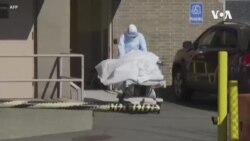ນຶ່ງປີຫຼັງຈາກຫຼາຍມະຫາວິທະຍາໄລ ແລະວິທະຍາໄລຫລາຍແຫ່ງໃນສະຫະລັດໄດ້ປິດປະຕູໄວ້ ແລະຫັນໄປສູ່ການຮຽນທາງອອນລາຍເພື່ອຮັບມືກັບພະຍາດ ໂຄວິດ-19, ຜົນກະທົບຂອງມັນຕໍ່ການສຶກສາຂັ້ນສູງຍັງສືບຕໍ່ມີຢູ່. ນັກຂ່າວວີໂອເອ Jesusemen Oni ມີລາຍງານເພີ່ມເຕີມ ກ່ຽວກັບເລື້ອງນີ້ ຊຶ່ງ ບົວສະຫວັນ ຈະນໍາມາສະເໜີທ່ານໃນອັນດັບຕໍ່ໄປ.
ໃນຂະນະທີ່ຊຸມຊົນຕ່າງໆ ໃນທົ່ວສະຫະລັດກຳລັງດີ້ນຮົນສູ້ກັບຈໍານວນຂອງຄົນ ຕິດໄວຣັສໂຄໂຣນາ ທີ່ເລີ້ມມີຂຶ້ນແຕ່ເດືອນມີນາປີກາຍເປັນຕົ້ນມາ, ມະຫາວິທະ ຍາໄລ ແລະວິທະຍາໄລຫລາຍຮ້ອຍແຫ່ງ ໄດ້ປິດວິທະຍາເຂດຂອງຕົນໄວ້, ຊຶ່ງ ເຮັດໃຫ້ຊີວິດຂອງບັນດາອາຈານ ແລະນັກສຶກສາຂອງພວກເພິ່ນຜັນແປໄປ.
ທ້າວ ແຕ ອາໂຢເດຈີ (Tae Ayodeji), ນັກສຶກສາຕ່າງປະເທດຈາກໄນຈີເຣຍ ກ່າວຜ່ານທາງ Skype ວ່າ:
“ຂ້ອຍຕ້ອງໄດ້ຄິດຢູ່ເລື້ອຍໆ, ຄ້າຍຄືວ່າ ຂ້ອຍບໍ່ຮູ້ວ່າ ຂ້ອຍຈະໄປຮອດໃສ. ມັນແມ່ນເລື້ອງທີ່ເຮັດໃຫ້ເກີດຄວາມເຄັ່ງຄຽດແທ້ໆໄດ໋.”
ນັກສຶກສາຊັ້ນສູງ ທີ່ສ່ວນໃຫຍ່ແລ້ວ ອາຍຸຕໍ່າກວ່າ 29 ປີ ແມ່ນຢູ່ໃນກຸ່ມ ທີ່ມີຄວາມສ່ຽງຕໍ່າທີ່ສຸດ ທີ່ຈະຕິດໄວຣັສຢ່າງຮ້າຍແຮງ, ອີງຕາມສູນກາງຄວບຄຸມ ແລະປ້ອງ ກັນພະຍາດ ຫລື CDC. ເຖິງຢ່າງໃດກໍ່ຕາມ, ນັກຄົ້ນຄວ້າທີ່ວິທະ ຍາໄລອິມເພີ ຣຽລ (Imperial) ໃນນະຄອນລອນດອນ ພົບວ່າ ພວກຄົນໜຸ່ມ ນອນຢູ່ໃນບັນດາຜູ້ທີ່ນໍາເຊື້ອທີ່ໃຫຍ່ທີ່ສຸດ ໄປຕິດຜູ້ອື່ນໃນຊຸມຊົນ ແລະເປັນໄພຂົ່ມຂູ່ຕໍ່ຜູ້ທີ່ມີລະບົບພູມຕ້ານທານທີ່ອ່ອນແອ.
ໂດຍທີ່ບໍ່ມີຍຸດທະສາດແຫ່ງຊາດແນະນໍາໃຫ້ໂຮງຮຽນວ່າ ຄວນຮັບມືກັບພະຍາດ ນີ້ຄືແນວໃດແລ້ວ, ສະຖາບັນການສຶກສາ ກໍໄດ້ໃຊ້ວິທີການທີ່ແຕກຕ່າງກັນໂດຍທີ່ບາງສະຖາບັນ ກໍໄດ້ປ່ຽນແປງວິທີການຂອງພວກເຂົາເຈົ້າ ໃນການຮັບມື. ທໍາ ອິດ, ພວກເຂົາເຈົ້າໄດ້ສົ່ງນັກຮຽນກັບບ້ານ, ຫຼັງຈາກນັ້ນ ກໍໄດ້ນຳເອົາພວກເຂົາກັບມາເຂົ້າໂຮງຮຽນອີກ ຊຶ່ງກໍມີແຕ່ ໄດ້ສົ່ງພວກເຂົາກັບຄືນໄປບ້ານອີກເທົ່ານັ້ນ.
ທ່ານເຟີເດີຣິກ ລໍເຣນສ໌ (Frederick Lawrence), ອະດີດປະທານມະຫາ ວິທະຍາໄລແບຣນດາຍສ໌ (Brandeis) ໃນລັດແມສຊາຈູແຊສ (Massachusetts) ກ່າວຜ່ານທາງ Skype ວ່າ:
"ເວົ້າຢ່າງກົງໄປກົງມາເດີ້, ມັນຄ້າຍຄືແບບທີ່ວ່າ ຍິງຖືກ ແລະຍິງຜິດໄປເພາະວ່າ ໂຮງຮຽນມີການປ່ຽນແປງ ຢ່າງວ່ອງໄວ."
ໃນທ້າຍພາກຮຽນຂອງລະດູບານໃໝ່, ໂຮງຮຽນສ່ວນໃຫຍ່ໄດ້ຮັບຮອງເອົາແບບ ຮຽນທາງອອນລາຍ ຫຼື ການຮຽນແບບປະສົມປະສານກັນ.
ທ່ານ ລໍເຣນສ໌ ກ່າວຜ່ານທາງ Skype ອີກວ່າ:
"ໂຮງຮຽນທີ່ມີຈຳນວນຄົນຮຽນທາງອອນລາຍຈຳກັດ ແມ່ນກຳລັງຫັນປ່ຽນຕົວເອງໄປສູ່ການເປັນສະຖາບັນການສຶກສາທາງອອນລາຍ ໂດຍໄດ້ຫັນເອົາວິຊາຮຽນຫຼາຍຮ້ອຍອັນ, ບາງຄັ້ງກໍຫຼາຍພັນອັນ ໃຫ້ເຂົ້າໄປສະໜອງຜ່ານທາງອອນ ລາຍ."
ແຕ່ນັກຮຽນກໍຈົ່ມວ່າ ການຮຽນຮູ້ແບບອອນລາຍໄດ້ສະໜອງປະສົບການດ້ານການສຶກສາ ໃນລະດັບຮອງລົງມາ ຍ້ອນປະສົບກັບບັນຫາດ້ານເຕັກໂນໂລຈີ ແລະການຂາດເຂີນ ການສະໜັບສະໜູນ ແລະຊັບພະຍາກອນ.
ທ້າວພຣີຊັຽສ ອາເດຕາໂຢ-ໂອກັນຕາເດ (Precious Adetayo-Oguntade), ນັກສຶກສາມະຫາວິທະຍາໄລລັດແມຣີແລນ ກ່າວຜ່ານທາງ Skype ວ່າ:
“ມັນເປັນສິ່ງທີ່ອຶດອັດໃຈຫລາຍ ເພາະຂ້ອຍຮູ້ສຶກວ່າ ຂ້ອຍຈ່າຍເງິນຫຼາຍປານນີ້ເພື່ອສອນຕົວເອງຢູ່ໃນທາງ YouTube."
ການລົງທະບຽນໃນພາກຮຽນລະດູໃບໄມ້ຫລົ່ນ ໄດ້ຫຼຸດລົງຫຼາຍ. ໂຮງຮຽນຕ່າງໆ ແມ່ນເສຍລາຍໄດ້. ທ່ານ ລິນ ປາສເຄີແຣລລາ (Lynn Pasquerella), ປະ ທານສະມາຄົມວິທະຍາໄລ ແລະມະຫາວິທະຍາໄລອາເມຣິກາ ກ່າວຜ່ານທາງ Skype ວ່າ:
"ຢູ່ໃນຫຼາຍໆລະດັບ, ມັນແມ່ນການຂາດຄວາມສາມາດໃນການລະດົມທຶນ ເພື່ອ ຈັດງານໃຫຍ່ໆ, ເພື່ອຈັດການແຂ່ງຂັນກິລາເຕະບານ ແລະ ຂາດຜູ້ລະດົມທຶນ ງານສົ່ງເສີມກິດຈະກຳ ທີ່ໄປຄຽງຄູ່ກັນກັບສິ່ງນັ້ນໆ."
ໃນລະດູໃບໄມ້ຫລົ່ນ, ໂຮງຮຽນຫຼາຍແຫ່ງໄດ້ເປີດຫໍພັກ ແລະເປີດໃຫ້ດຳເນີນກິດ ຈະກຳໃນວິທະຍາເຂດຄືນເປັນບາງສ່ວນ ແຕ່ວ່າ ບາງແຫ່ງ ກໍຖືກບັງຄັບໃຫ້ປິດເປັນຄັ້ງທີສອງ ຍ້ອນການລະບາດຂອງໄວຣັສໂຄໂຣນາ.
ແຕ່ຢ່າງໃດກໍ່ຕາມ, ນັກຮຽນບາງຄົນ ທີ່ກັບເຂົ້າມາໃນໂຮງຮຽນເວົ້າວ່າ ຊີວິດໃນວິທະຍາເຂດແມ່ນຄຸ້ມຄ່າຕໍ່ກັບຄວາມສ່ຽງ. ສຳລັບນັກສຶກສາຕ່າງປະເທດ, ທ້າວ ແຕ ອາໂຢເດຈີ (Tae Ayodeji), ການຮຽນຮູ້ໂດຍທາງໄກ ຈາກປະເທດໄນຈີ ເຣຍ ເປັນເວລາ 10 ເດືອນ ແມ່ນໄດ້ຮັບຜົນກະທົບ.
ທ້າວ ແຕ ອາໂຢເດຈີ ກ່າວຜ່ານທາງ Skype ວ່າ:
“ມັນເປັນການຍາກແທ້ໆ ເມື່ອມີຄວາມແຕກຕ່າງກັນດ້ານເວລາ. ພ້ອມກັນນັ້ນ ໃນເລື້ອງເຊັ່ນວ່າ ສັນຍານໄວ-ຟາຍ (Wi-Fi) ໃນປະເທດໄນຈີເຣຍ ບໍ່ດີປານ ໃດ ເພາະສະນັ້ນ ມັນກໍ່ມີບັນຫາທາງເຕັກໂນໂລຈີຢູ່ຕະຫຼອດ.”
ໃນໂຮງຮຽນທີ່ປະສົບຜົນສຳເລັດໃນການເປີດໂຮງຮຽນໄວ້ຢູ່ນັ້ນ, ການລະມັດ ລະວັງເພື່ອປ້ອງກັນໂຄວິດ ໄດ້ກາຍມາເປັນແບບແຜນດໍາລົງຊີວິດໄປແລ້ວ.
ທ້າວພຣີຊັຽສ ອາເຕາໂຢ-ໂອກັນຕາເດ (Precious Adetayo-Oguntade) ເວົ້າວ່າ:
“ດຽວນີ້ມັນແມ່ນເດືອນມີນາ, ຂ້ອຍຮູ້ສຶກມີຜ້າອັດປາກເປັນຄຸໆ ແທ້ໆ ຢູ່ໃນຫໍພັກຂອງຂ້ອຍ, ມີເຈລລ້າງມື, ຢູ່ໂຮງຮຽນ, ພວກເຮົາຕ້ອງໄດ້ຮັບການກວດພະຍາດສອງຄັ້ງຕໍ່ອາທິດ ແລະພວກເຮົາຕ້ອງຂຽນໃສ່ແບບຟອມການຕິດຕາມກວດເບິ່ງໂຄວິດ. ສະນັ້ນ ມັນຄ້າຍຄືກັບວ່າ ຂ້ອຍກໍກໍ່ລຶ້ງເຄີຍກັບມັນແລ້ວ.”
ໂດຍທີ່ມີຢາວັກຊີນໄວ້ໃຫ້ສັກແລ້ວ ແລະມີກໍລະນີຄົນຕິດພະຍາດໂຄວິດ-19 ໜ້ອຍລົງກວ່າເກົ່າ ໃນສະຫະລັດ, ຜູ້ຊ່ຽວຊານຄາດຄະເນວ່າ ຈະມີການກັບຄືນສູ່ຕາຕະລາງປົກກະຕິໃນລະດັບໃດນຶ່ງສຳລັບທຸກຫ້ອງຮຽນ ໃນສົກຮຽນລະດູໃບ ໄມ້ຫລົ່ນນີ້. ນີ້ແມ່ນຂ່າວທີ່ໜ້າຍິນດີນໍາ ສຳລັບນັກສຶກສາຜູ້ທີ່ເວົ້າວ່າ ໄວຣັສໄດ້ ເຮັດໃຫ້ປະສົບການໃນການຮຽນຢູ່ໃນມະຫາວິທະຍາໄລຂອງພວກເຂົາເຈົ້າຂາດ ໄປ.
ນາງ ອິສລແບລລາ ລາຍເນີເຣສ (Isabela Linares), ນັກສຶກສາຕ່າງປະ ເທດຈາກໂຄລອມເບຍ ກ່າວຜ່ານທາງ Skype ວ່າ
“ແນວຄວາມຄິດຂອງການທີ່ສາມາດອາໄສຢູ່ໃນວິທະຍາເຂດ, ມີສາຍພົວພັນອັນດີກັບອາຈານ ທີ່ຂ້ອນຂ້າງວ່າ ເປັນຄວາມຮູ້ສຶກແບບມີຊຸມຊົນທີ່ແຕກຕ່າງໄປຈາກໂຮງຮຽນທີ່ຢູ່ໃນປະເທດໂຄລອມເບຍ. ດຽວນີ້ຮູ້ສຶກວ່າ ມັນບໍ່ມີຄວາມແຕກຕ່າງກັນຢ່າງແທ້ຈິງເລີຍ.”
ມີຂ່າວດີອັນນຶ່ງສຳລັບສຶກສາທີ່ກຳລັງຈະເຂົ້າຮຽນໃນໄວໆນີ້, ວິທະຍາໄລ ແລະມະຫາວິທະຍາໄລຈຳນວນນຶ່ງ ໄດ້ຍົກເວັ້ນຂໍ້ກຳນົດກ່ຽວກັບຄະແນນສອບເສັງແບບມາດຕະຖານ, ຊຶ່ງໄດ້ກຳຈັດອຸປະສັກ ໃນການລົງທະບຽນສຳລັບປີຈະມາເຖິງນີ້ໃຫ້ໝົດ.
ອ່ານຂ່າວນີ້ເພີ້ມເປັນພາສາອັງກິດຢູ່ລຸ່ມນີ້
Students and Schools Still Grappling with Impact of COVID-19 in U.S.
One year after many universities and colleges in the United States shut their doors and transitioned to virtual learning in response to COVID-19, the ripple effect continues to impact higher education. VOA’s Jesusemen Oni has more.
As communities across the United States wrestled with staggering numbers of coronavirus cases last March, hundreds of universities and colleges closed their campuses, disrupting the lives of their faculty and students.
Tae Ayodeji, International Student from Nigeria: Skype:
“I had to keep thinking, like, I don't know where I'm going to go. It was really stressful.”
Higher education students — most younger than 29 — are among the least vulnerable to severe illness from the virus, according to the CDC. However, researchers at Imperial College in London found that young adults are among the biggest spreaders in communities and pose a threat to those with weakened immune systems.
Without a national strategy for how schools should respond, educational institutions took different approaches with some changing their approach on the fly. First, they sent students home, then brought them back only to send them home again.
Frederick Lawrence, Former President of Brandeis University in Massachusetts Skype:
"Frankly, it was kind of hit and miss, because schools were changing quickly."
By the end of spring semester, most schools had adopted online or hybrid learning models.
Frederick Lawrence, Former President of Brandeis University in Massachusetts: Skype:
“Schools that had very limited online presence were transforming themselves into online education institutions, were transferring hundreds, sometimes thousands of courses into online delivery.”
But students complained virtual learning offered a second-rate educational experience riddled with technological issues and a lack of support and resources.
Precious Adetayo-Oguntade, University of Maryland Student:Skype
“It’s frustrating because I feel like I’m paying this much to teach myself on YouTube.”
Enrollment for the fall semester dropped. Schools lost money.
Lynn Pasquerella, President, The Association of American Colleges and Universities: Skype:
“On a number of levels, it's a lack of the capacity to do fundraising, to hold big events, to hold football games and fundraisers, booster events that go along with that.”
In the fall, many schools reopened dorms and partially resumed on-campus operations but some were quickly forced to close for a second time because of coronavirus outbreaks.
Still, some students who returned said campus life was worth the risk. For international student Tae Ayodeji, 10 months of remote learning from Nigeria had taken a toll.
Tae Ayodeji, International Student from Nigeria Skype:
“It was really hard with the time difference. Also like in Nigeria the Wi-Fi isn't really great so there was technological issues all the time.”
In schools that have succeeded in staying open, COVID precautions have become a way of life.
Precious Adetayo-Oguntade, University of Maryland Student:
“Now it's March, I literally have a bucket of masks in my dorm, hand sanitizer, at school we have to get tested twice a week and we have to fill out a COVID monitoring form. So it's like, I've just gotten used to it.”
With available vaccines and fewer new COVID-19 cases in the U.S., experts predict a return to a somewhat normal schedule for the fall classes. This is welcome news for students who say the virus has cheated them out of their college experience.
Isabela Linares, International Student from Colombia Skype:
“The idea of being able to live on campus, have good connections with professors, that kind of like sense of community which is very different from like what schools in Colombia offer. Now it feels like there's no real difference.”
There is one piece of good news for incoming students, a number of colleges and universities have waived standardized test requirements, removing an enrollment hurdle for the upcoming year.





